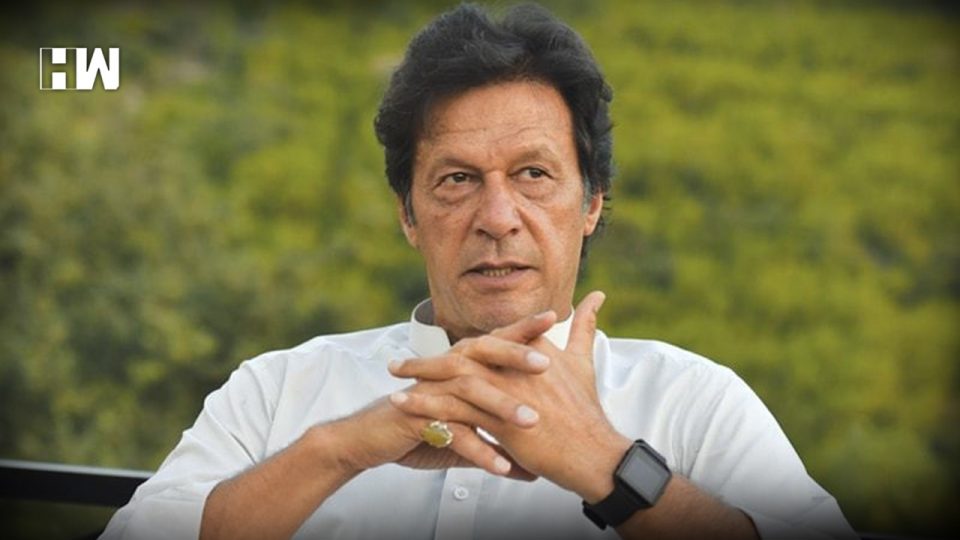Imran Khan was catapulted to global fame as a World Cup cricket champion, but the man known in the West as a celebrity playboy is now seeking to lead Pakistan as a populist, religiously devout, anti-corruption reformist.
Career in Cricket

Photo Courtesy: Web
Khan’s professional cricketing career started at the age of 16 when he made his first-class debut for Lahore against Sarghodha in 1968. He became the captain of the Pakistan cricket team in 1982. He was declared international cricketer of the year in 1989-90, he led Pakistan to victory in 1992 World Cup. Khan retired from cricket in 1992 as one of Pakistan’s most successful players.
In total, he made 3,807 runs and took 362 wickets in Test cricket, and is one of eight world cricketers to have achieved an ‘All-rounder’s Triple’ in Test matches. He was later, in 2010, inducted into the ICC Cricket Hall of Fame.
Personal life

Photo Courtesy: Web
In the West, the man who led Pakistan’s 1992 World Cup champion cricket team is typically seen through the prism of his celebrity status and memories of his high-profile romances, including a nine-year marriage to British socialite Jemima Goldsmith. They have two sons – Sulaiman Isa (1996) and Kasim (1999). In 2015, he married journalist Reham Khan and divorced after nine months. He married his spiritual advisor Bushra Manika on February 18, 2018.
Politics

Photo Courtesy: Web
Khan entered Pakistan’s chaotic politics in 1996 promising to fight graft. For his first decade and a half as a politician, he sputtered, with PTI never securing more than a few seats in the national assembly. Khan supported General Pervez Musharraf’s military coup in 1999, believing Musharraf would “end corruption, clear out the political mafias”. According to Khan, he was Musharraf’s choice for prime minister in 2002 but turned down the offer.
In October 2007, he resigned along with other members, in protest at Pervez Musharraf’s re-election as president while still army chief. Imran went into hiding soon after Musharraf declared a state of emergency on November 3. Police detained him on November 14 after he had emerged from hiding to lead a student protest.
On 21 April 2013, Khan launched his final public relations campaign for the 2013 elections from Lahore where he addressed thousands of supporters at the Mall. Khan announced that he would pull Pakistan out of the US-led war on terror and bring peace to the Pashtun tribal belt.
Currently, PTI is running a nationwide campaign including areas far from its northwestern and urban strongholds. To shore up its chances of winning, PTI has begun luring candidates away from Sharif’s party, stirring controversy among long-time party loyalists who say Khan is relying on the same corrupt politicians he once denounced.
Controversies
In August 2017, Pak politician Ayesha Gulalai came forward with allegations of harassment against Khan and claimed that she had been receiving offensive messages from him since October 2013. In an interview, Khan said that he suspected that the Pakistan Muslim League (Nawaz) had used Gulalai for these allegations of harassment against him.
Khan has also been attacked for his repeated calls to hold talks with militants and for his party’s alliance with Sami ul Haq, the so-called Father of the Taliban whose madrassas once educated Taliban stalwarts Mullah Omar and Jalaluddin Haqqani.
Earlier this month, the al Qaeda-linked Harkat-ul-Mujahideen announced their support for Khan’s party, with pictures of the US-designated terrorist group’s leader posing with PTI hopefuls posted online.
As an independent media platform, we do not take advertisements from governments and corporate houses. It is you, our readers, who have supported us on our journey to do honest and unbiased journalism. Please contribute, so that we can continue to do the same in future.

